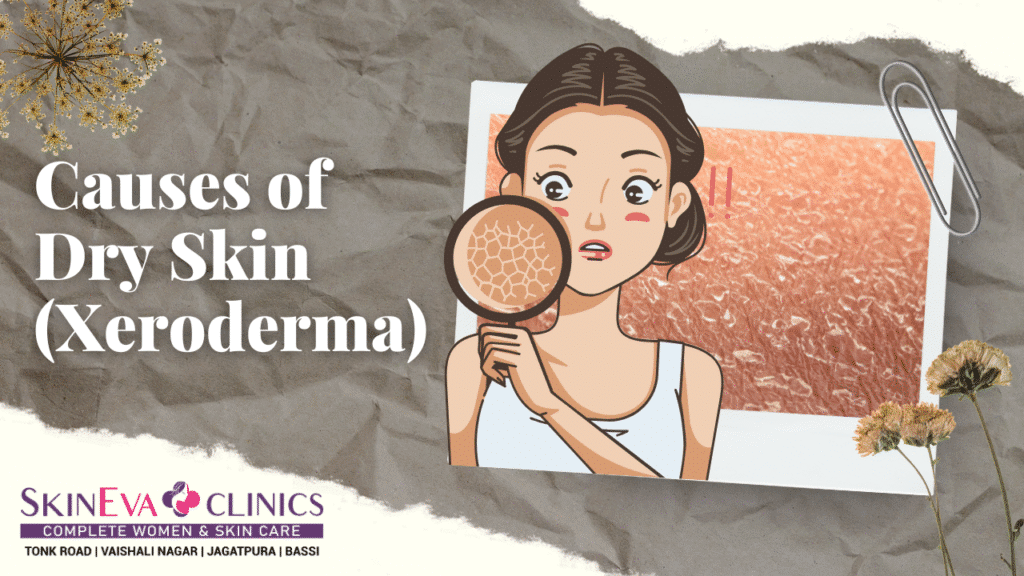Causes of Dry Skin (Xeroderma): A Comprehensive Guide

Introduction
Dry skin is one of the most common skin concerns faced by people of all ages, across all climates. It may seem like a minor issue at first—just a bit of tightness or flakiness—but for many, it can lead to discomfort, itching, and even skin damage if not managed properly. Also known by its medical names xerosis or xeroderma, dry skin occurs when the skin lacks adequate moisture or natural oils, which are essential for keeping the skin soft, smooth, and protected.
This condition can be seasonal, often worsening in cold or dry weather, but it can also be caused by a range of lifestyle, environmental, or medical factors. While it is usually not serious, persistent or severe dryness can interfere with daily life and may be a sign of an underlying skin disorder.
What is Dry Skin?
Dry skin is a skin condition where the skin’s outermost layer (the epidermis) loses too much water and oil, leading to a rough, tight, or flaky texture. In medical terms, this condition is known as xeroderma or xerosis. Healthy skin typically maintains a balanced layer of moisture and oil, which acts as a protective barrier. However, when this balance is disrupted—due to environmental exposure, aging, harsh skincare products, or health conditions—the skin becomes dehydrated and loses its elasticity.
Dry skin can present differently in each individual. For some, it might appear as mild scaling or itching, while for others, it may lead to visible cracks, redness, or even bleeding in more severe cases. It can affect the face, hands, arms, legs, or any part of the body, and sometimes coexists with other conditions like eczema or psoriasis.
What Are the Causes of Dry Skin?
Several internal and external factors can interfere, leading to dryness, roughness, flaking, and even cracking of the skin. Identifying what causes your skin to dry out is crucial in preventing and managing the issue effectively.
1. Environmental Factors
- Cold and Dry Weather: During colder months, the air becomes drier, pulling essential moisture from your skin and making it prone to dryness.
- Low Indoor Humidity: Heaters, radiators, and air conditioners significantly lower the moisture in the air, drying out your skin.
- Excessive Sun Exposure: Long-term exposure to UV rays harms the skin’s surface and interferes with its ability to hold moisture.
- Wind Exposure: Windy conditions dehydrate the skin by increasing evaporation from the surface.
2. Skincare Habits and Personal Routine
- Frequent Washing or Bathing: Taking long, hot showers or washing skin repeatedly can wash away natural oils, leaving the skin unprotected and dry.
- Harsh Soaps and Cleansers: Many soaps, shampoos, and detergents contain strong chemicals that strip away the skin’s lipid layer, leading to moisture loss.
- Over-Exfoliation: Exfoliating too often or with harsh scrubs can damage the skin’s protective layer and cause irritation and dryness.
- Lack of Moisturizing: Failing to apply moisturizer regularly or using the wrong type for your skin can lead to inadequate hydration.
- Swimming in Chlorinated Water: Chlorine in pools can irritate and dry out the skin.
3. Medical Conditions
- Eczema (Atopic Dermatitis): A chronic inflammatory skin condition that often causes dry, itchy patches.
- Psoriasis: An autoimmune skin condition characterized by thick, scaly, dry patches of skin.
- Ichthyosis: This is a genetic skin disorder that results in extremely dry, thickened, and scaly patches of skin.
- ·Diabetes: Elevated blood sugar levels can dehydrate the skin, making it dry and more prone to irritation.
- Hypothyroidism: Reduced thyroid hormone levels slow metabolism and decrease oil production, resulting in dry skin.
- Kidney Disease: When kidneys don’t function well, the skin can become parched and itchy due to fluid imbalance.
- Medications and Treatments
- Certain Medications: Diuretics, antihistamines, acne medications (like retinoids), and cholesterol-lowering drugs may reduce skin moisture as a side effect.
- Cancer Treatments: Treatments like chemotherapy and radiation often result in dry, irritated skin by weakening its natural shield.
- Dialysis: Patients undergoing dialysis often experience dry, itchy skin due to fluid and nutrient imbalances.
5. Aging and Hormonal Changes
- Natural Aging Process: Over time, the skin produces less oil and becomes thinner, reducing its ability to stay naturally hydrated. Sebum production also decreases, leading to dryness.
- Hormonal Changes: Menopause and other hormonal shifts can cause a decline in oil production and skin elasticity.
6. Nutritional and Lifestyle Factors
- Dehydration: Not drinking enough water leads to reduced moisture content in the skin.
- Poor Nutrition: A lack of essential fatty acids, vitamins (especially A, D, E), and minerals affects the skin’s ability to stay hydrated.
- Smoking: Tobacco reduces blood flow and damages collagen and elastin, leading to premature aging and dry skin.
- Alcohol Consumption: Alcohol acts as a diuretic and may dehydrate the skin if consumed excessively.
7. Genetic and Hereditary Causes
- Inherited Skin Conditions: Some people are genetically predisposed to dry skin due to inherited disorders like ichthyosis or simply a lower baseline of natural oil production.
8. Occupational Exposure
- Frequent Hand Washing: Jobs that require constant handwashing (e.g., healthcare workers, cooks, cleaners) increase the risk of dry, cracked hands.
- Exposure to Chemicals: Occupations involving solvents, detergents, or industrial chemicals can break down the skin barrier.
- Outdoor Workers: Those who work in sun, wind, or cold conditions without adequate protection are more prone to dryness.
9. Clothing and Physical Factors
- Wearing Tight Clothing: Tight garments or compression wear can create friction and trap heat, worsening dry or irritated skin.
- Allergic Reactions to Fabrics or Detergents: Certain textiles or laundry chemicals can trigger dryness or allergic contact dermatitis.
Conclusion
Dry skin is a complex condition with multiple potential causes. From environmental exposures to personal habits, aging, medical issues, and even occupation—many factors may contribute to your skin losing its natural moisture. Identifying the specific cause or combination of causes in your case is the first step toward finding the most effective solution.




Leave a Comment